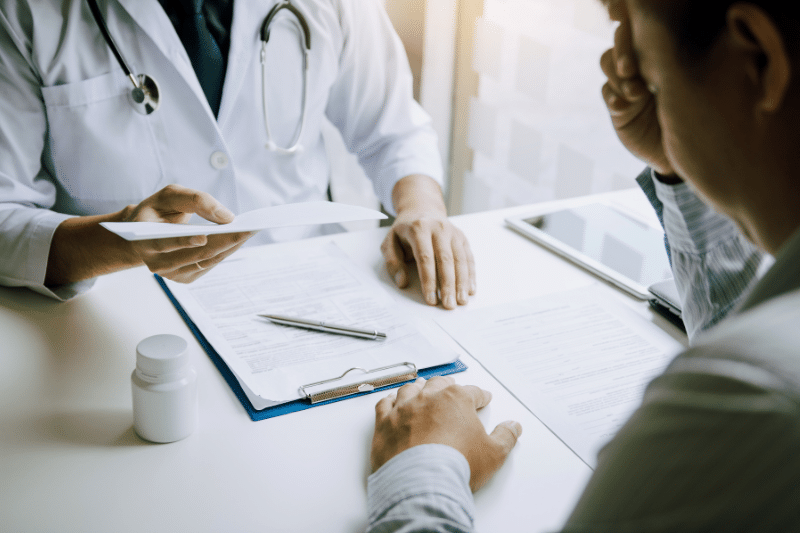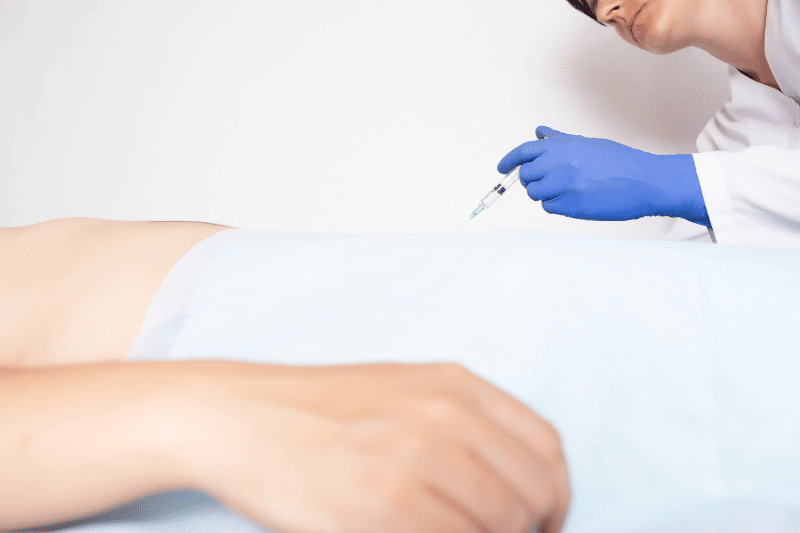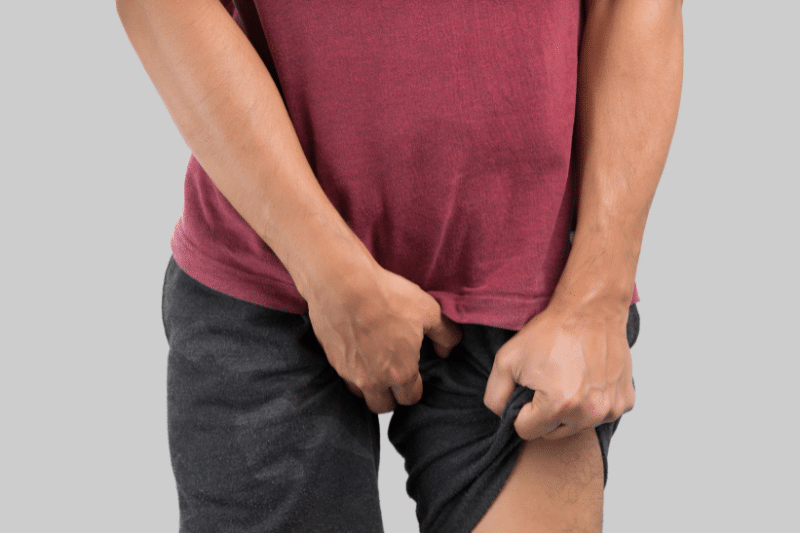Varicocele is a condition that affects many men but is often misunderstood or overlooked until symptoms become severe. Subclinical varicocele can also affect fertility even if it doesn’t cause noticeable symptoms. For some, it causes discomfort, while for others, it can impact fertility.
Varicocele Overview
A varicocele is an enlargement of the veins within the scrotum, similar to varicose veins that occur in the legs. It happens when blood pools in these small veins, causing them to swell. Most often, found on the left side of the scrotum, but it can occur on both sides. Surgical interventions aim to redirect blood flow through healthy veins to alleviate symptoms.
Definition and Explanation of Varicocele
It is a medical condition characterized by abnormal dilation and enlargement of the scrotal venous pampiniform plexus. This condition is quite common, affecting approximately 15% of the male population, with a higher prevalence among men experiencing infertility.
Varicoceles are similar to varicose veins that occur in the legs, but they specifically affect the scrotum, which houses the testicles, blood vessels, and part of the spermatic cord. The scrotal veins become enlarged and twisted, leading to potential discomfort and fertility issues.
How Does a Varicocele Form?
A varicocele forms when the valves inside the veins of the spermatic cord fail to function properly. Normally, these valves ensure that blood flows in the right direction, but when they malfunction, blood can flow backward and pool in the veins. This pooling causes the veins to become swollen and twisted, resulting in a varicocele.
While the exact cause of varicoceles is not fully understood, it is believed to be a combination of genetic predisposition and environmental factors. The increased pressure in the veins, particularly on the left side due to anatomical differences, also plays a significant role in the formation of varicoceles.
What Is the Main Cause of Varicocele?
The primary cause of varicocele is defective valves in the veins of the spermatic cord. The anatomical position of the testicular artery can influence the development of varicocele, as its proximity to the veins can affect blood flow dynamics. This condition is more common during puberty when the testicles are growing rapidly and require more blood flow.
What Does a Varicocele Look Like?
Visually, it may resemble a “bag of worms” due to the twisted and swollen veins. However, in some cases, it may not be visible, and the swelling can only be detected through a physical examination.
How Common Is Varicocele in Men?
It is relatively common, affecting around 15% to 20% of men worldwide. It is also found in male infertility in approximately 40% of men who are evaluated for infertility.
A study published by the World Health Organization in 2024 revealed that 15% of adult men experience varicocele, with 35% to 40% of men diagnosed with infertility being affected by the condition.
Should I Be Worried if I Have a Varicocele?
While it isn’t life-threatening, it can cause discomfort and affect fertility. Men who experience pain or are having difficulty conceiving should consult a healthcare professional for an evaluation. Most varicoceles are harmless, but it’s essential to monitor them to avoid complications.
Can It Go Away on Its Own?
In most cases, it will not go away on its own. However, mild varicoceles may not require treatment if they are not causing discomfort or fertility issues. In some instances, lifestyle changes, like avoiding heavy lifting, may prevent the condition from worsening.
What Is the Role of Genetics in Varicocele?
Genetics can play a role in the development of varicocele. If you have a family history of varicose veins or varicoceles, your risk of developing the condition may be higher. However, not all cases are linked to genetics.
Can Lifestyle Factors Cause It?
Yes, lifestyle factors like heavy lifting or prolonged standing can increase pressure in the abdominal region, which may contribute to the development or worsening the condition. Additionally, jobs that involve physical strain may elevate the risk.
Does Age Affect the Likelihood of Developing It?
Varicoceles often develop during adolescence, but they can occur at any age. The condition is more common in younger men, particularly during puberty, as the testicles grow and blood flow increases.

Varicocele – Symptoms, Testicular Pain, and Diagnosis
What Are the Symptoms of Varicocele?
Symptoms vary from person to person. Some men experience no symptoms at all, while others may notice swelling, a dull ache, or an aching pain or feeling of heaviness in the scrotum. The pain typically worsens after standing or physical activity and may improve when lying down.
How Is Varicocele Diagnosed?
Often diagnosed during a physical examination. A healthcare provider may feel the scrotum for swollen veins. If it is large enough, it may be visible. In some cases, an ultrasound confirms the diagnosis, especially if it is small or not easily detected during the exam.
In the United States, about 15% of adult men diagnosed with varicoceles and up to 40% of men presenting with infertility, according to a 2024 report from the American Urological Association.
Can a Varicocele Cause Pain?
Yes, it can cause discomfort or testicular pain. Doctors describe the pain of adolescent varicocele is usually as a dull, aching sensation that worsens after standing or physical exertion. However, many men experience no pain at all.
Can Varicocele Cause Erectile Dysfunction?
While it can affect sperm production and fertility, it is not typically associated with erectile dysfunction. However, the discomfort and psychological stress related to varicocele may indirectly impact sexual function in some men.
What Are the Different Grades of Varicocele?
Graded based on their size and severity:
Grade 1
Small and only detectable during a physical exam when performing a Valsalva maneuver (straining or bearing down on the lower abdomen).
Grade 2
Moderate in size and palpable during a physical exam without straining.
Grade 3
Large and easily visible through the skin of the scrotum.
Can a Varicocele Affect Sperm Count or Fertility?
One of the most concerning complications is its impact on fertility. It can lead to decreased sperm quality and decreased testosterone production, making it difficult for some men to conceive. The exact mechanism is unclear, but it is believed that the increased temperature in the scrotum due to the pooled blood affects sperm production.
How Do I Know If I Have a Varicocele?
If you notice swelling, discomfort, or a “bag of worms” sensation in your scrotum, you may have a varicocele. A healthcare professional can confirm the diagnosis through a physical exam or ultrasound.
Can Varicocele Be Detected with an Ultrasound?
Yes, an ultrasound is a common method for diagnosing the scrotal varicocele itself. It allows the healthcare provider to see the enlarged veins and assess the severity of the condition. This non-invasive test provides a clear picture of the scrotal veins and helps in determining the best course of treatment.

How is a Varicocele Detected?
Detecting a varicocele typically begins with a physical examination. During the exam, a healthcare provider may ask the patient to stand, sit, or perform a Valsalva maneuver (bearing down as if having a bowel movement) to better assess the veins in the scrotum. If it is large enough, it may be palpable or even visible.
For smaller or less obvious varicoceles, an ultrasound is often used to provide a detailed view of the scrotal veins. Additionally, a semen analysis and blood test can help determine the impact of a varicocele on fertility. Varicoceles are graded based on their severity, and treatment recommendations, including various types of varicocelectomy, are made accordingly.
Varicocele – Causes and Risk Factors
What Causes Varicocele?
It is caused by malfunctioning valves in the veins of the spermatic cord. These valves usually help regulate blood flow, but when they fail, blood pools in the veins, causing them to enlarge. The exact cause of valve malfunction is unclear, but it may be related to genetics, lifestyle factors, or anatomical abnormalities.
Is There a Link Between Varicocele and Lifestyle Habits?
Certain lifestyle habits, such as heavy lifting or prolonged standing, can contribute to the development or worsening of the condition. Jobs that require physical exertion may increase abdominal pressure, leading to vein enlargement in the scrotum.
A study published in the Journal of Men’s Health in 2024 found that men with physically demanding jobs are 30% more likely to develop varicocele compared to those with sedentary occupations.
Can It Develop Due to Injury?
While not typically caused by a specific injury, trauma to the groin area may exacerbate existing varicoceles or cause swelling that mimics the symptoms. If you experience groin trauma and notice symptoms, it’s important to consult with the healthcare provider for a proposer diagnosis.
Is It More Common on the Left Side?
Yes, the condition is more common on the left side. This is because of the anatomical differences in how blood flows through the left and right testicular veins. The left testicular vein is longer and has more pressure to drain blood, so it’s more prone to valve malfunction and varicocele formation.
Are Athletes More Likely to Get It?
Athletes who do heavy lifting, running, or standing for long periods may have a higher risk of getting varicocele due to increased pressure in the abdominal and groin area. But there’s no concrete evidence that athletic activity.
Standing for Long Periods Increase the Risk?
Yes, standing for long periods can increase abdominal pressure which may contribute to varicocele formation or worsening. Men with jobs that require long hours of standing like retail or construction workers.

Varicocele – Treatment Options
How Do You Get Rid of Varicocele?
Surgeons treat varicocele through both surgical procedures and non-surgical methods. The most common surgical option is a varicocelectomy, where the swollen veins and affected veins are tied off to redirect blood flow. Non-surgical options include varicocele embolization, a minimally invasive outpatient procedure that blocks the affected veins.
Does Varicocele Always Require Surgery?
Not all require surgery. In cases where the condition is mild and not causing pain or fertility issues. Then the surgeon may not recommend a repeat procedure as the treatment. However, clinically significant varicocele requires surgical intervention particularly, for men experiencing discomfort or infertility.
Can Varicocele Be Treated Without Surgery?
Certainly, in case of mild symptoms, then it’s manageable without surgery. Lifestyle changes, such as avoiding heavy lifting, wearing supportive underwear, and applying cold compresses, can help alleviate symptoms. In some cases, doctors also prescribe medications to manage pain or discomfort.
What Is Varicocele Embolization, and How Does It Work?
Varicocele embolization is a minimally invasive procedure that blocks blood tests to the affected veins. A small catheter is inserted into an enlarged vein in the groin or neck, and a special material is used to block blood flow to the enlarged veins. This procedure is an alternative to surgery and has a quicker recovery time.
A 2024 study published in The Journal of Vascular and Interventional Radiology found that varicocele embolization has a success rate of approximately 85% to 90%, with fewer complications compared to traditional surgery.
What Lifestyle Changes Can Help?
Lifestyle changes like wearing supportive underwear, not lifting heavy, and taking breaks from standing for long periods can help manage symptoms. Eating healthy and staying hydrated can also improve circulation.
Are There Any Natural Remedies for Varicocele?
There are no scientific natural remedies but some men find relief from discomfort by using herbal supplements, cold compresses, and stress management techniques. But these should not replace medical treatment for male infertility especially.
Can Wearing Supportive Underwear Help Varicocele Symptoms?
Yes, wearing supportive underwear or an athletic supporter can help relieve scrotal discomfort by giving extra support to the scrotum. This is especially helpful during physical activity or standing for long periods.
What Medications Are Used to Treat Varicocele?
There are no medications to treat the condition. But over-the-counter pain relievers like ibuprofen or acetaminophen can help manage discomfort. In some cases, doctors may prescribe medications to pain medication to improve blood flow.

Varicocele – Surgery and Recovery
When Is Varicocele Surgery Necessary?
Surgeons typically recommend surgery when the condition causes significant or severe pain and often, affects fertility. Moreover, if it is large enough to cause discomfort. Additionally, if it does not improve with conservative treatments. Then surgeons consider performing a surgery.
Is Varicocele Surgery Worth It?
For men experiencing pain or fertility issues, then surgery can be highly beneficial. Studies show that surgery can improve sperm quality and reduce discomfort. However, after the consultation with the healthcare provider, only then the decision to undergo surgery finalized.
According to a 2024 study from the American Urological Association, varicocele surgery improves sperm quality in about 60% of men and leads to increased pregnancy rates in couples struggling with infertility.
What Are the Risks of Varicocele Surgery?
Like any surgery, varicocelectomy carries risks, including infection, bleeding, and recurrence of the varicocele. Testicular atrophy is also a potential risk, particularly if there is an inadvertent injury to the testicular artery during the procedure. However, these risks are relatively low, and most men recover without complications.
How Long Does It Take to Recover from Varicocelectomy Surgery?
Recovery from varicocele surgery typically takes about one to two weeks. Most men can return to normal activities within two weeks, although full recovery may take longer.
What Are the Long-Term Side Effects of Varicocele Surgery?
Most men experience no long-term side effects from varicocele surgery. However, in rare cases, complications such as infection, hydrocele (fluid buildup around the affected left testicle part), or recurrence can occur.
Is Varicocele Surgery Painful?
Usually administers varicocele surgery under local or general anesthesia. Therefore, patients do not feel pain during the procedure. However, some discomfort during recovery manageable with pain relievers and pain medication.
What Is the Success Rate of Varicocelectomy?
The success rate of varicocelectomy surgery is high, with about 90% of men experiencing improvement in symptoms of impaired fertility and sperm quality. However, the success of the surgery depends on the severity and the individual’s overall health.
Can It Come Back After Surgery?
While rare, varicocele can recur after surgery. The recurrence rate – between 10% and 15%, depending on the surgical technique used.
Is Varicocele Surgery Done Under Local Anesthesia?
The medical team administers surgery under local or general anesthesia. Depending on the surgeon’s recommendation and the patient’s preference. Local anesthesia numbs the area, while general anesthesia puts the patient to sleep during the surgical procedure itself.
What Is the Downtime for Varicocele Surgery?
Most men can return to light activities within a few of home the recovery room the same day or days of surgery. But doctors recommend avoiding strenuous activities and heavy lifting for at least two weeks. Full recovery usually takes about four to six weeks.

Varicocele – Impact on Male Infertility and Life After Surgery
Can a Man with Varicocele Get a Woman Pregnant?
Yes, many men with varicocele can still father children. However, varicocele can reduce sperm quality and quantity, which may affect fertility. If you and your partner are struggling to conceive, it may be worth consulting a healthcare provider for an evaluation.
Does Varicocele Surgery Improve Fertility?
Evidently, varicocele surgery improves sperm quality in many men, which can increase the chances of conception. Studies have found that men who undergo varicocele repair have a higher likelihood of successful pregnancies compared to those who do not undergo treatment.
What Happens After Varicocele Surgery?
After surgery, most men experience an improvement in symptoms, including reduced pain and discomfort. Furthermore, if the surgeon performs the surgery to improve male fertility only. Then it may take several months for sperm quality to improve.
A 2024 study published in Fertility and Sterility found that 70% of men who underwent varicocele surgery saw an improvement in sperm and semen quality, within six months.
Can You Live a Normal Life After Varicocele Surgery?
Yes, most men can return to their normal activities and lead a healthy life after surgery. Generally, the procedure is safe and effective, and the majority of men experience significant improvement in symptoms.
What Is the Success Rate of Testicular Varicocele Surgery?
The success rate of testicular varicocele surgery is high, with studies showing that 80% to 90% of men experience improvement in symptoms and sperm quality after the procedure.
How Long After Varicocele Surgery Can You Try to Conceive?
Generally, surgeons recommend waiting at least three to six months after surgery before attempting to conceive. This allows time for sperm quality to improve. However, the timeline can vary depending on the individual, so it’s best to consult with your healthcare provider.
What Lifestyle Adjustments Needed After Varicocele Surgery?
After surgery, it’s important to avoid heavy lifting and strenuous activities during the recovery period. Wearing supportive underwear and following your doctor’s recommendations will help ensure a smooth recovery. Additionally, maintaining a healthy diet and staying hydrated can promote better circulation and overall health.
Understanding varicocele is the first step toward managing the condition and making informed treatment decisions. While many men with varicocele experience no symptoms, others may struggle with pain, discomfort, or fertility issues. Whether you’re considering surgery or exploring lifestyle changes, it’s important to consult with a healthcare provider to determine the best course of action for your individual needs.










